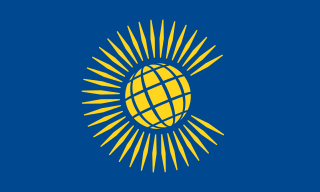The Commonwealth Heads of Government Meeting is a biennial summit meeting of the governmental leaders from all Commonwealth nations. Despite the name, the head of state may be present in the meeting instead of the head of government, especially among semi-presidential states. Every two years the meeting is held in a different member state and is chaired by that nation's respective prime minister or president, who becomes the Commonwealth Chair-in-Office until the next meeting. Queen Elizabeth II, who was the Head of the Commonwealth, attended every CHOGM beginning with Ottawa in 1973 until Perth in 2011, although her formal participation only began in 1997. She was represented by the Prince of Wales at the 2013 meeting as the 87-year-old monarch was curtailing long-distance travel. The Queen attended the 2015 summit in Malta and the 2018 summit in London, but was represented again by the Prince of Wales at the 2022 meeting in Rwanda.
Chief Emeka Anyaoku, GCON, GCVO, CFR, CON is a Nigerian diplomat of Igbo descent. He was the third Commonwealth Secretary-General. Born in Obosi, Anyaoku was educated at Merchants of Light School, Oba, and attended the University College of Ibadan, then a college of the University of London, from which he obtained an honours degree in Classics as a College Scholar. Aside from his international career, Chief Anyaoku continues to fulfill the duties of his office as Ichie Adazie of Obosi, a traditional Ndichie chieftainship.

The National Security Council is a federal institutional and consultative body chaired by the Prime Minister of Pakistan as its chairman. The NSC is a principal forum that is mandated for considering national security and foreign policy matters with the senior national security advisers and Cabinet ministers. The idea and inception of National Security Council was first conceived in 1969 under the President Yahya Khan, its functions were to advise and assist the president and prime minister on national security and foreign policies.

The Intergovernmental Group of Twenty-Four on International Monetary Affairs and Development, or The Group of 24 (G-24) was established in 1971 as a chapter of the Group of 77 in order to help coordinate the positions of developing countries on international monetary and development finance issues, as well as and to ensure that their interests are adequately represented in negotiations on international monetary matters. Though originally named after the number of founding Member States, it now has 28 Members. Although the G-24 officially has 28 member countries, any member of the G-77 can join discussions.
The Commonwealth Foundation (CF) is an intergovernmental organisation that was established by the Commonwealth Heads of Government in 1966, a year after its sister organisation, the Commonwealth Secretariat. The Foundation is located at Marlborough House in London, a former royal palace which was assigned for the use of these Commonwealth institutions by Her Majesty Queen Elizabeth II, the former Head of the Commonwealth. As the Commonwealth agency for civil society, the Foundation is funded by 49 member states to support participatory governance through its programmes. The Foundation provides resources, grants and access to platforms to encourage better engagement between civil society and institutions of governance. Membership of the Commonwealth Foundation is voluntary and is separate from membership of the Commonwealth of Nations.

Commonwealth Prime Ministers' Conferences were biennial meetings of Prime Ministers of the United Kingdom and the Dominion members of the British Commonwealth of Nations. Seventeen Commonwealth Prime Ministers' Conferences were held between 1944 and 1969. As well, the prime ministers met for a Commonwealth Economic Conference in 1952. These series of conferences were a continuation and regularisation of the earlier Imperial Conferences which had been held periodically from 1887 to 1937. Since 1971, Commonwealth Heads of Government Meetings have been held.

The Commonwealth of Nations, often simply referred to as the Commonwealth, is an international association of 56 member states, the vast majority of which are former territories of the British Empire from which it developed. They are connected through their use of the English language and historical-cultural ties. The chief institutions of the organisation are the Commonwealth Secretariat, which focuses on intergovernmental relations, and the Commonwealth Foundation, which focuses on non-governmental relations between member nations. Numerous organisations are associated with and operate within the Commonwealth.

The 1973 Commonwealth Heads of Government Meeting, officially known as the II Commonwealth Heads Meeting, and commonly known as Ottawa 1973, was the second Meeting of the Heads of Government of the Commonwealth of Nations. It was held from 2 to 10 August 1973 in Ottawa, hosted by Prime Minister Pierre Trudeau. It was the first CHOGM to be attended by the Head of the Commonwealth, Elizabeth II.
The 1975 Commonwealth Heads of Government Meeting, officially known as the III Commonwealth Heads Meeting, and commonly known as Kingston 1975, was the third Meeting of the Heads of Government of the Commonwealth of Nations. It was held from 29 April to 6 May 1975 in Kingston, Jamaica, and was hosted by that country's Prime Minister, Michael Manley.

The 2013 Commonwealth Heads of Government Meeting was the 23rd Meeting of the Heads of Government of the Commonwealth of Nations. It was held in Colombo, Sri Lanka, from 15 to 17 November 2013. Commonwealth leaders agreed on Sri Lanka as the 2013 host for the meeting when they met in Port of Spain, Trinidad and Tobago, in 2009. Sri Lanka, which was originally slated to host the summit in 2011, was accused of committing atrocities during the Sri Lankan civil war and the summit was instead held in Perth, Australia; Colombo was given the 2013 summit instead. The leaders of Canada, Mauritius, and India boycotted the summit, citing alleged human rights violations by Sri Lanka against its Tamil minority. Protests were also banned during the summit. President Mahinda Rajapaksa summarised the summit's events as: "Issues covered in the communique include development, political values, global threats, challenges and Commonwealth cooperation." However, the meeting was overshadowed by controversy over Sri Lanka's human rights record and the alleged war crimes during the final stages of the civil war. This was the first time in 40 years that the Head of the Commonwealth, Queen Elizabeth II, was not present at the CHOGM.

From 1947 to 1956, the Dominion of Pakistan was a self-governing country within the Commonwealth of Nations that shared a monarch with the United Kingdom and the other Dominions of the Commonwealth. The monarch's constitutional roles in Pakistan were mostly delegated to a vice-regal representative, the governor-general of Pakistan.

The Cabinet Committee on National Security (CCNS or C2NS), (Urdu: کابینہ کمیٹی قومی سلامتی) previously known as the Defence Committee of Cabinet, is the principal federal institution and consultative forum used by the people-elected Prime Minister of Pakistan for concerning matters of state's national security, geopolitical, geostrategic, and foreign policy matters with the Prime minister's chief military advisers, senior government advisers and senior Cabinet ministers.
The 1969 Commonwealth Prime Ministers' Conference was the 17th Meeting of the Heads of Government of the Commonwealth of Nations. It was held in the United Kingdom in January 1969, and was hosted by that country's Prime Minister, Harold Wilson.
The 1953 Commonwealth Prime Ministers' Conference was the sixth Meeting of the Heads of Government of the Commonwealth of Nations. It was held in the United Kingdom in June 1953 on the occasion of the coronation of Queen Elizabeth II, and was hosted by that country's Prime Minister, Sir Winston Churchill.
The 1957 Commonwealth Prime Ministers' Conference was the ninth Meeting of the Heads of Government of the Commonwealth of Nations. It was held in the United Kingdom in June 1957, and was hosted by that country's Prime Minister, Harold Macmillan.

The 1960 Commonwealth Prime Ministers' Conference was the tenth Meeting of the Heads of Government of the Commonwealth of Nations. It was held in the United Kingdom in May 1960, and was hosted by that country's Prime Minister, Harold Macmillan.
The 1965 Commonwealth Prime Ministers' Conference was the 14th Meeting of the Heads of Government of the Commonwealth of Nations. It was held in the United Kingdom in June 1965, and was hosted by that country's Prime Minister, Harold Wilson.

The 2015 Commonwealth Heads of Government Meeting, also known as CHOGM 2015 was the 24th Meeting of the Heads of Government of the Commonwealth of Nations. It was held in Malta from 27 to 29 November. Sri Lankan President Maithripala Sirisena handed the position of Commonwealth Chair-in-Office to Maltese prime minister Joseph Muscat at the meeting.

The Valletta Summit on Migration, also called the Valletta Conference on Migration, was a summit held in Valletta, Malta, on 11–12 November 2015, in which European and African leaders discussed the European migrant crisis. The summit resulted in the EU setting up an Emergency Trust Fund to promote development in Africa, in return for African countries to help out in the crisis.









